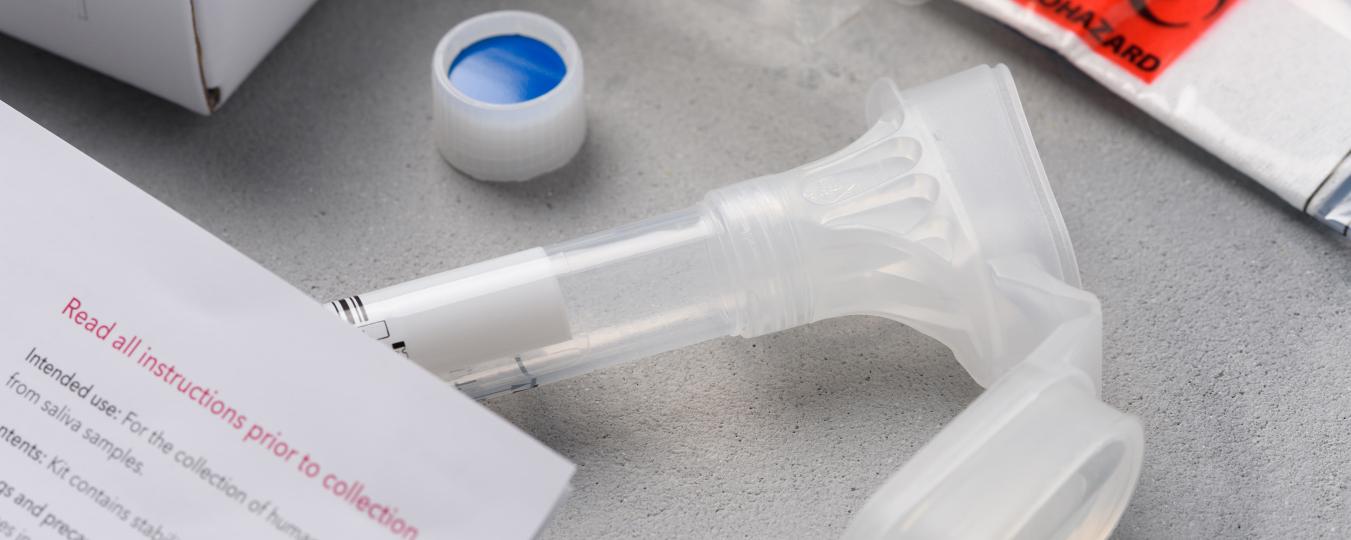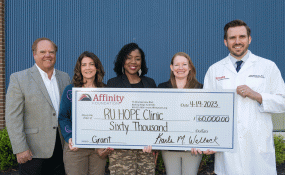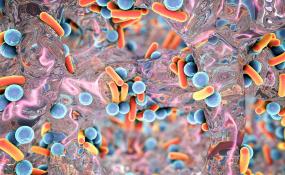At Rutgers, the Rapid COVID-19 Test Was Just the Beginning
The Rutgers Institute for Infectious and Inflammatory Diseases made worldwide news last year when its researchers developed a multivariant COVID-19 test that was faster, easier and cheaper than anything previously available. Now leaders of the institute believe Rutgers researchers are poised to make far greater contributions to global health in years to come.
Ongoing projects seek to produce everything from revolutionary allergy treatments to rapid tests for other pathogens to high-tech bandages designed to make wounds heal faster and better.
Nicholas Bessman, a recent recruit from Cornell University, is researching a nutritional treatment that would fight cancer and inflammatory bowel disease by creating a healthier gut microbiome. Karen Edelblum, a researcher recruited from the University of Chicago, has identified an immune cell population in the intestinal barrier that may be targeted for the treatment of Crohn’s disease and ulcerative colitis. Mark Siracusa, originally recruited from the University of Pennsylvania, has recently formed a company called NemaGen that is marketing a novel treatment that targets mast cells to control severe allergic reactions, Their different projects all share a similar basic strategy: targeting harmful components of the immune system while favoring the beneficial functions that guard against infectious diseases.
“We’re at this incredible period in history when advances in our fundamental understanding of both infection and inflammation give us an unprecedented opportunity to create better more personalized treatments for a wide range of conditions: AIDS, malaria, influenza, diabetes, asthma, cardiovascular disease and many more,” said William C. Gause, director of the institute and a Rutgers professor of medicine and a senior associate dean for research.
“We saw both this big opportunity for innovation and a relative lack of research organizations in the space, so Rutgers jumped in with both feet and launched the institute as a major initiative in 2016,” Gause said. “Our team has been doing important work from the start, but after six years of both internal and external recruiting, we have assembled a large team of brilliant people, and the pace of innovation continues to accelerate.”
So far, the institute has expanded from just an idea to 53 full faculty members and about 150 associate faculty members, most of whom also have appointments in other Rutgers schools. Collectively, institute faculty attract about $70 million in annual funding from the National Institutes of Health (NIH) to one of four distinct centers:
- Center for Emerging and Re-emerging Pathogens
- Center for Immunity and Inflammation
- Public Health Research Institute (PHRI)
- Center for Covid Response and Pandemic Preparedness (CCRP2)
The institute has also just launched the new Center for Virus-Host-Innate-Immunity (CVHII) and a new program in neuroinflammation that will operate in collaboration with the Rutgers Brain Health Institute.
External seminar series, journal clubs, data clubs and working lab meetings — many of which are open to researchers throughout Rutgers — have promoted extensive cross-laboratory collaborations that have attracted multi-investigator NIH grants.
The COVID-19 pandemic has made the dangers of infectious disease apparent to all, but the institute’s founders were discussing these dangers and advocating potential solutions long before COVID-19 even existed.
Indeed, early documents from the institute now seem prescient. A PowerPoint presentation Gause gave at several meetings in 2018 predicted the institute would be able to help global health by developing novel rapid diagnostic tests for rapidly spreading pathogens. In 2021, a team led by David Alland, who directs both the PHRI and the CCRP2, did exactly that.
The test, which Rutgers made freely available worldwide, was the first COVID-19 test to use “sloppy molecular beacon probes,” which are highly sensitive and specific DNA sequences used to detect frequent mutations in organisms. It was developed and validated in just a few weeks.
“We are well positioned to develop many other tools of equal or greater impact,” said Alland, who also is chief of the division of infectious diseases at Rutgers New Jersey Medical School. “We have a great team and great facilities as well, including some that are truly rare, like an NIH-funded regional biocontainment laboratory — one of 12 in the US — where research on highly infectious select pathogens can be conducted in biosafety level 3 laboratory conditions. That’s a pretty nice thing to have when you’re doing infectious disease research.”
Media Contact
Andrew Smith
[email protected]




